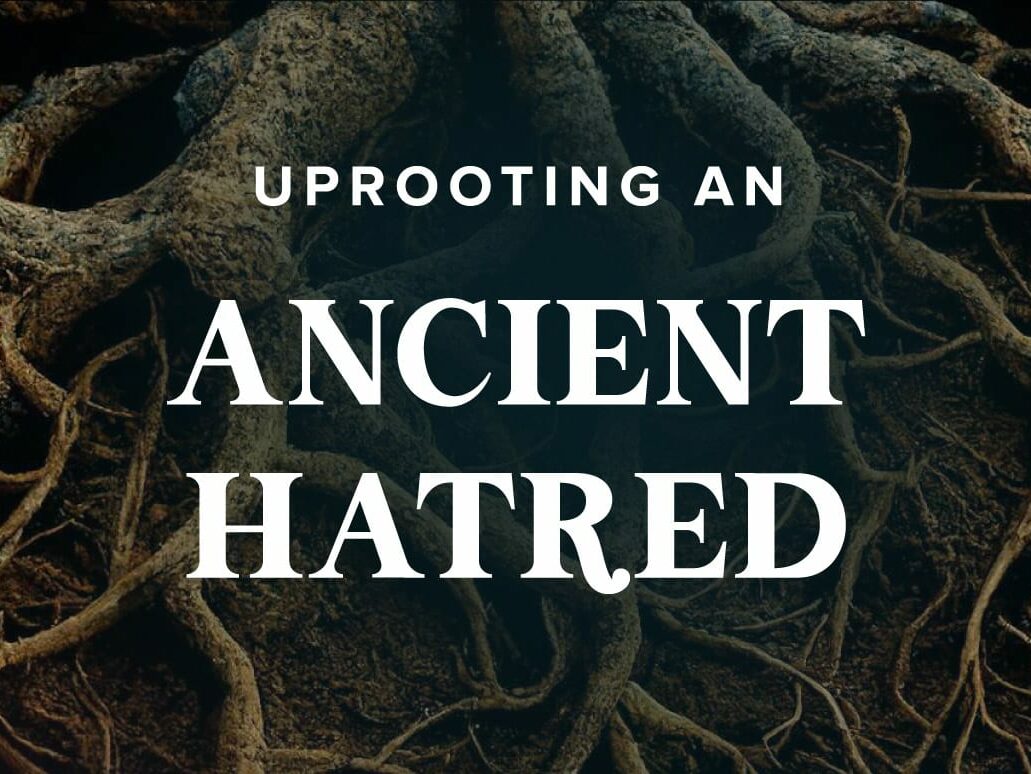Jesus and the Pharisees
Jesus had real conflicts with the religious leaders of His day, to be sure, and there were times Jesus gave hair-raising accusations to the scribes and Pharisees. But were those meant for the Jewish people, as a whole? Did Jesus condemn all Jewish people, for all time? Jesus was Jewish. The apostles – all Jewish. The early Church – all Jewish. When Jesus returns as King one day – still Jewish.
Did Jesus announce antisemitic or anti-Jewish judgments during His ministry? Did any Biblical writers voice God’s rejection of Jewish people as a nation? Absolutely not.
Was Jesus antisemitic?
Are some of the critical words Jesus spoke to His Jewish audiences to be understood as antisemitic or anti-Jewish? That’s a question that has been debated over the years, and supporting such a claim opened the door to antisemitism in the Church and a warped view of Jesus.
The Importance of Biblical Context
Context is king. Remember that.
This phrase was drilled into me when I began studying the Bible. One of the primary principles for interpreting Scripture is to consider the context of the verse. What’s the flow of thought through the entire passage? What’s around it? Widen the scope.
We use the context principle all the time, in various applications. If I said, “That’s a great trunk!” You wouldn’t know if I was speaking of a tree, an elephant, a car, swimwear . . . but factor in our conversation about a transatlantic trip and you’d know I meant luggage, of course! Context is king.
How do we settle the question? Context is king.

What accusation did Jesus make against the pharisees?
Let’s look at three passages that have been used as exhibits A – C in accusations against the Jewish people, apply the context principle and see what the Scriptures really say. What we’ll see is Jesus spoke directly to the small group of religious leaders who not only sought to kill Him but had tragically hindered many Jews from seeing the truth of the gospel. To this group of unrepentant leaders, Jesus aimed His words.
Jesus and the Pharisees Verses: John 8:44
In John 8:44, Jesus said, “You are of your father the devil, and you want to do the desires of your father.”
Do Jews have horns?
Over the centuries, this verse helped give rise to the Jewish people being falsely stereotyped as having horns and cloven hooves. It also began with a mistranslation of Moses’ face shining (rather than having horns) in Exodus 34:29. In 1505, Pope Julius II commissioned Michelangelo to fashion a marble statue of Moses for his tomb; the sculpture depicts Moses having two horns. Many Europeans but especially the Nazis caricatured the Jewish community with physical deformities – demonizing their appearance to look like the devil.
Just in case someone thinks this is only an ancient characterization, I have a Jewish friend, a brilliant high school teacher, who was asked by a student what she had done with her horns. It’s appalling.
Spiritual Sons of Satan
Of course this is a gross contortion of Jesus’s words. Never, not for a minute, was any of that at the heart of what Jesus said. Jesus addressed the scribes and Pharisees who stood arrogantly in the crowd that day, testing Him, looking for some ground of accusation. They claimed Abraham as their father and having never been enslaved. Yes, they were from Abraham’s lineage, but Jesus said everyone who commits sin is a slave to sin. Jesus called them to do the works of their father Abraham, the father of faith. Yet their hearts and actions, revealed they were spiritual sons of Satan – not the entire Jewish nation for all time – but these religious leaders who He addressed in that setting.Jesus and the Pharisees Verses: Matthew 21:13
In Matthew 21:43, Jesus said, “Therefore I say to you, the kingdom of God will be taken away from you and given to a people producing the fruit of it.”
This verse has been interpreted by some to mean salvation was removed from the Jewish people, as a whole. It has been used as a proof-text for the belief that Israel’s sin brought on God’s rejection of the entire Jewish nation. Salvation isn’t an option for the Jewish people, they claim.
Church Fathers and Anti-Jewish Thought
Hear these quotes from early Church leaders.
Tertullian (155-220 AD):
- “God’s choice has now been transferred to the Gentiles who are capable of living at a higher level than the Jewish people.”
Augustine (354-430 AD):
- “The Church admits and knows that Jewish people are to be cursed.”
John Chrysostom (347-407 AD):
- “The synagogue is worse than a brothel . . . the den of scoundrels . . . the temple of demons . . . the cavern of devils. (It is) a criminal assembly of Jews . . . a place of meeting for the assassins of Christ . . . a gulf and abyss of perdition. . . . I would say the same things about their souls.”
Wow! Did you see what happened there? Chrysostom railed against the synagogue and then stretched his condemnation to the Jewish soul! Applied to the people as a whole! That is antisemitism in the heart of a Church father, and it had disastrous impact.
What did Jesus mean in accusing the Pharisees?
Is that what Jesus meant? Of course not. Never. What does context reveal? Jesus had just given a parable about a landowner who entrusted a vineyard to vine-growers and then went on a journey. The vine-growers were unfaithful, violent men, who didn’t care for the vineyard and sought to kill the landowner’s son. In verses 45-46 we read: When the chief priests and the Pharisees heard His parables, they understood that He was speaking about them. When they sought to seize Him, they feared the people, because they considered Him to be a prophet.
It was about the religious leaders, the corrupt establishment, not the people as a nation.
The Pharisees’ Rejection of Jesus
The kingdom of God is available to everyone but not without repentance from sin and turning to God in faith through Jesus. Luke 7:30 says: the Pharisees and the lawyers rejected God’s purpose for themselves, not having been baptized by John. What was John’s baptism? The baptism of repentance. Oh, the Pharisees went to John at the Jordan for baptism alright, but he rejected them because there was no confession of sin. He instructed them to “bear fruit in keeping with repentance.” (Matt. 3:5-8)
Religiosity vs. Grace
Jesus was saying salvation and all the inheritance privileges of the kingdom of God would go, not to those appearing uber religious, but to those who have mourned their sin and fallen upon the grace of God for salvation.
Did the Jews kill Christ?
Matthew 27:25
Here’s one more, and it’s probably the most common accusation against the Jewish people throughout Church history with secular cultures taking a cue from the Church and hurling the same insult. The Jews killed Christ. John Chrysostom coined the word deicide (killing God!).
In this example, it’s not Jesus’s words being misinterpreted, but words from others within the biblical narrative.
Jesus and the Pharisees Verses: Matthew 27:25
Matthew tells us the chief priests and elders (religious leaders) hired Judas to betray Jesus. The same group stirred the crowds to demand Barabbas’s release and Jesus’s crucifixion.
Matthew 27:25 says, “all the people” called for Jesus’s blood to be on them and their children. An astonishing invitation. Add to this Peter’s words on the Day of Pentecost in Acts 2 and 3 where he addressed the “men of Israel” and said they had “crucified the Lord” and “killed the author of life.” Was there a Jewish responsibility for the death of Jesus? Yes, but it was upon a limited number, not the Jewish people as a nation.
Did the Romans kill Jesus?
Historical and political context requires us to consider what part the Romans played. By law, Jewish leaders were unable to perform capital punishment, so they had to execute Jesus through the Romans. The Romans bear some guilt.
Did we kill Jesus?
Isaiah wrote that the Messiah would be “pierced for our transgressions . . . crushed for our iniquities.” It was my sin that nailed Jesus to the cross – it was yours.
Did Jesus give Himself for us?
And yet, John 3:16 tells us that God so loved the world that He gave His son. Jesus said in John 10:18 that no one had taken His life away, but He laid it down on His own initiative. In fact, the offering of Jesus’s life on the cross is called “the good news” throughout the Scriptures. The Lamb was slain before the foundation of the world (Revelation 13:8). It’s the message of the Bible – the eternal plan revealed: Jesus left heaven, took the form of a man, became the servant of all, and in perfect obedience to His heavenly Father, offered His life as a ransom for our release from slavery to sin.
There’s no way the Father, Jesus, or any Biblical writer meant all Jewish people for all time must bear the guilt of the cross. Biblical context and historical context underscore this truth.
What should the Pharisees have done?
Let’s also understand that Jesus didn’t condemn the whole lot of scribes and Pharisees to an eternity in hell, but each individual had, and still has, a choice: What will I do with the truth about Jesus the Messiah?
Although Jesus had intense encounters with the Jewish leaders, the gospels record that many of them believed in His testimony. Acts 21:20 says tens of thousands of Torah zealous Jews, believed and were saved.
Jesus and Nicodemus the Pharisee
I love the story in John 3 of one of the Pharisees, Nicodemus, who went to Jesus by night, likely from fear of the others. The kingdom of God was on his mind. He needed help putting the pieces together. How could he enter the kingdom? You must be born again, was Jesus’s answer. A few years later, just months before Jesus went to the cross, we find Nicodemus again.
There was a great division among the people and religious leaders as to who Jesus was. Some proclaimed, “He is the Messiah!” Others, “He is certainly a prophet!” The Pharisees and priest looked at one another and questioned whether any of them believed in Him. “Surely, you don’t, do you?” Nicodemus spoke up. “Our Law does not judge a man unless it first hears from him and knows what he is doing, does it?” The Bible says everyone went home.
A Pharisee Transformed
The next Passover, the rabbi from Galilee, Jesus the Messiah, hung on a cross to open the way for Nicodemus, for the thief at Jesus’s side, for you, for the world to have peace with God and the forgiveness of sins. Two Jewish leaders, Joseph of the Sanhedrin and Nicodemus of the Pharisees, took the body. Nicodemus brought one hundred pounds of mixed myrrh and aloes for the preparation of Jesus’s body for burial.
I can only imagine Nicodemus later that night – the grief, the questions, the love. A teacher in Israel, Nicodemus was well familiar with the Hebrew Scriptures. Might he have opened the scroll to Psalm 45 and by candlelight read: Your throne, O God, is forever and ever; a scepter of uprightness is the scepter of Your kingdom. . . . All Your garments are fragrant with myrrh and aloes . . . Tapping the words, his tears fell to the parchment. Never had he seen such sacrificial love. Oh, for one more encounter with the Messiah of Israel.
Uprooting an Ancient Hatred: What You Need to Know about Antisemitism – Free Video + PDF Guide Mini-series
What do you need to know about antisemitism? Find out in this unique 4-part mini-series that our education department developed especially for you.
- What is antisemitism? Why the rise in Jew-hatred today?
- History of antisemitism: Is this a part of Christianity?
- Antisemitism today
- How the Church can fight antisemitism
Articles Related to Jesus and the Pharisees in the Bible
Estimated reading time: 10 minutes

